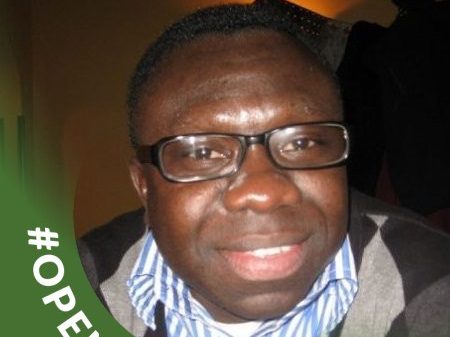From KWESI TAWIAH-BENJAMIN, Canada
When you set out to emigrate (leave your country for another) you are either traveling in hope or you are traveling hopefully. There is all the difference, and the immigrant (the person arriving into a new country, often to live permanently) must internalize this truism.
You travel in hope when you set goals ahead of the journey. Careful planners move with good skills to target particular jobs in the new country.
When you travel hopefully, well, hopefully you might find what you hoped for.
In my line of business, I encounter both travelers daily.
I learn a new thing everyday–from refugees telling strange stories to buy acceptance in Canada–to fairly settled immigrants navigating familiar territories with the anxiety of a new refugee.
The immigration conversation targets the tenured professor as a useful guest who has overstayed their welcome, just as it weighs with some disdain the homophobic fleeing from a country where his LGBTQI orientation puts his life in danger.
I contend with these positions every morning when I say ‘hello’ to the panhandler who sits in front of the hotel where some new refugees are housed.
I look just like the people I am providing services for, so he does not care about my status in Canada.
While a mere street beggar, he is a stakeholder in any policy decision.
Richer a plumber than a professor
What are my bona fides for pretending to speak like an umpire on a vexed subject that affects every economy.
I work in the sector but my traveling experiences make me a better immigration expert than my present designation.
I crossed over to these parts from England as a highly-skilled migrant.
In my skilled portmanteau were degrees in Law, communication, journalism, and English language, plus professional certificates in related disciplines.
I assured myself that Canada is the luckiest country on earth to host such a fine British–trained African brain.
I would soon learn that these were no skills at all; a plumber or electrician in Ontario has ready, practical skills to earn better money than a university professor.
Here, foreign qualifications do not qualify you for much until they are verified by a Canadian accreditation body.
That immediately launches you into an unhealthy competition with millions who boast higher and better-suited qualifications.
It makes sense to start all over or pick a college diploma to acquire employment-ready skills.
You are deemed overqualified for positions that only require Grade 12 (SHS).
Soon, you learn that a higher qualification may be an advantage so you put them on your resume anyway.
Here, work experience does not mean work history; it is another way of checking your working life in Canada.
I had read about these stories but they sounded like ‘cunningly devised fables’, especially for a person who had the Holy Spirit as part of my traveling accessories.
Stories about 50 something year old immigrants locking up their PhD credentials in drawers to drive taxis in Toronto. Stories about baristas (those who prepare and sell coffee in a shop) who earn more than barristers at law.
Stories about bad marriages and child support.
Stories about pretenders who do nothing for a living but live anyway. Stories about permanent residents moving out of the country.
Too late in the game
There is always some creature to blame in the immigration mix: the push factors, the pull factors and the imaginary factors.
There is a fourth creature to deal with if your pastor or spiritualist had prayed on your passport.
When you escape from the third world to an industrialized economy, you spend the first few months blaming your leaders for putting their politics before the economics.
You wonder what it would take to build the Accra-Kumasi roads anew.
You are relieved to have escaped an inglorious location and swear not to return, even if the situation gets better.
Confess, you love the order and manicured lawns in your new surroundings.
There are upsides and downsides to immigration, but when you emigrate in your 50s, there are mostly downsides.
We have often used the kids as an excuse to leave our countries, to give them a good education for the global economy.
I continue to justify my stay here with my kids’ love for snow, even though my total years abroad cut in half the age of my first born.
By an explicable design, Africans are late in everything: we go to school late; we wait years to get a job; more years to change jobs; we start saving late because of family demands; we marry late and have kids late.
You are old when you receive your student visa. As a mature student, you feel like Mike Tyson when you meet your Jake Pauls in a lecture room.
The waiting years for visa after ‘bouncing’ push your immigration plans awry.
Often you fly as an angry escapee than a sincere contributor to the host economy.
You are tired when you get here. You will meet equally tired people in the dating market.
You may import a not-too-tired partner from Ghana who might export you with divorce papers as a bill of lading.
When you clear yourself from the harbour of your misery, you are too drained to bargain for your share of the Canadian Promise (our American Dream).
You could go to Ghana to try politics or stay and drive uber.
When people ask me whether to move to Canada or suck it in Ghana, I answer like a mature journalist who just finished an interview with a politician.
When they ask how the interview went, they want you to say it was fantastic, even if they goofed away.
It is selfish to ask anybody who wants to escape hardship to stay back and build up, especially when Canada has such good coffee and maple syrup.
bigfrontiers@gmail.com
- Monday, May 12, 2025 Newspaper Headlines - 12 May 2025
- With honour culture, Mahama wouldn’t need appointee Code - 12 May 2025
- Dollar role under pressure from portfolio rebalancing - 11 May 2025




